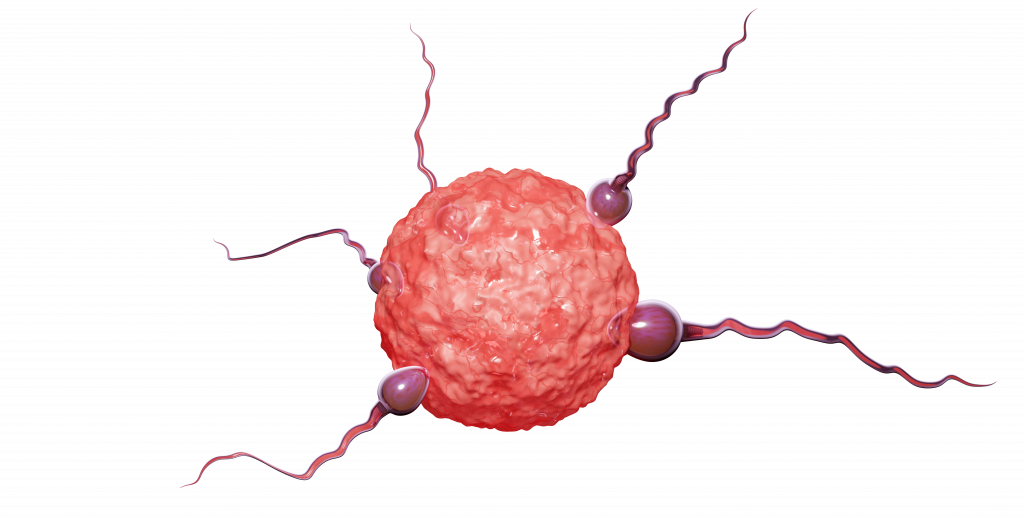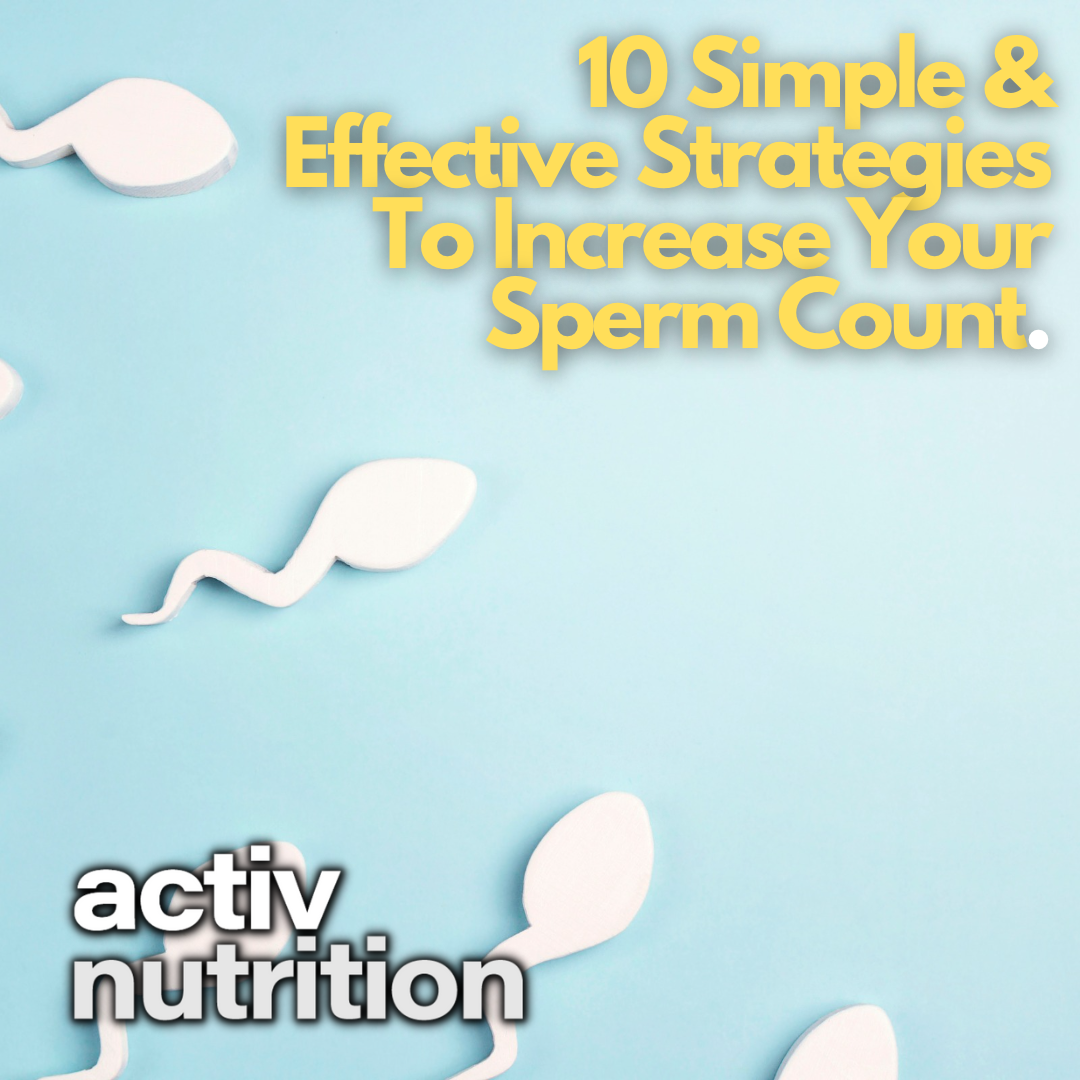10 Simple and Effective Strategies To Increase Your Sperm Count.
31/01/2023Sperm count, also known as sperm concentration, refers to the number of sperm in a man’s semen. A healthy sperm count is at least 15 million sperm per millilitre of semen. Low sperm count, also known as oligozoospermia, can contribute to infertility. Low sperm production can affect a man’s fertility, making it harder for him to conceive a child. In this article, we will discuss 10 strategies to help improve a man’s sperm count and enhance his chances of fathering a child.
Strategy 1: Consume A Healthy Diet
Eating a healthy diet is essential for overall health, including sperm health. Certain nutrients and minerals, such as vitamin C, zinc, and selenium, can improve sperm production and motility. A balanced and diverse diet is the key to getting all the necessary nutrients for sperm health.
Foods that are rich in these nutrients include:
- Citrus fruits like oranges and lemons for vitamin C
- Oysters for zinc
- Brazil nuts for selenium
- Leafy green vegetables, such as spinach and broccoli, for a variety of nutrients
- Fish, such as salmon, for omega-3 fatty acids
- Eggs for vitamin D
- Folic acid-rich foods like leafy greens, nuts and seeds
- Quinoa, lentils, and chickpeas for protein and minerals
Limiting added sugars is also essential, as they can negatively impact sperm health. Additionally, it’s crucial to drink enough water and stay hydrated as it helps to keep the sperm healthy and active.
Strategy 2: Maintain A Healthy Weight
Obesity has been linked to a lower sperm count and poor sperm quality. Studies have shown that men who are overweight or obese have a lower sperm count compared to men with a healthy weight. This is likely because excess body fat can increase estrogen levels, negatively impacting sperm production.
To maintain a healthy weight and improve sperm count, it’s essential to:
- Eat a balanced diet, including fruits, vegetables, whole grains, and lean proteins.
- Avoid processed foods and foods high in saturated fat.
- Get regular exercise, aiming for 150 minutes moderate or 75 minutes vigorous aerobic activity per week, or a combining both, in addition to muscle-strengthening activity at least two days per week.
- Avoid a Crash diet or rapid weight loss, as it can harm your overall health and sperm count.
Strategy 3: Reduce Alcohol Consumption
Studies have found that moderate alcohol consumption can negatively impact sperm count, motility, and morphology. Moderate drinking is defined as up to 2 drinks per day for men. Heavy alcohol use can also cause testicular damage and hormonal imbalances, leading to further problems with fertility.
To reduce alcohol consumption and improve sperm count:
- Set limits on how much alcohol you will consume each week.
- Find alternative activities you enjoy, such as exercise or hobbies
- Drink water in between alcoholic drinks to help slow down your alcohol consumption
- Avoid binge drinking and try to spread your drinks over the week
- Seek help if you have a problem with alcohol negatively affecting your life.
Strategy 4: Exercise Regularly
Regular exercise can help to improve the health of the reproductive system. When a man engages in regular physical activity, the body’s circulation improves, which can help to increase blood flow to the testicles. This increased blood flow can help to improve the function of the testicles and increase sperm production.
A 14-24 weeks training program focusing on aerobic and resistance exercises has improved semen quality, sperm motility, and increased testosterone levels. Weight resistance and cardiovascular exercises are recommended to maintain a healthy lifestyle and boost fertility.
Mindful of certain activities or habits that can potentially harm fertility:
- Competitive cycling and triathlons can be physically demanding and put pressure on the testicles, so it’s essential to practice them in moderation.
- Wearing an athletic cup during high-contact sports can protect the testicles from injury.
- Avoiding saunas or hot tubs, as heat can negatively impact sperm production.

Strategy 5: Get Enough Sleep
Studies have shown a link between sleep and sperm count. Getting enough sleep can positively impact sperm count and overall health. It’s also important to note that poor sleep quality or insomnia can adversely affect sperm count.
Tips for getting a good night’s sleep:
- Create a bedtime routine: This can signal your body that it’s time to shut down and get ready for sleep.
- Avoid screens before bed: The blue light emitted can disrupt melatonin production, making it harder to fall asleep.
- Make sure the bedroom is dark, quiet, and cool: This can help to create a more conducive environment for sleep.
- Stick to a consistent sleep schedule: This can help to regulate your body’s internal clock and make it easier to fall asleep.
- Avoiding heavy meals or caffeine before sleep
Strategy 6: Quit Smoking
Smoking can negatively impact fertility in several ways. Nicotine present in cigarettes can cause the blood vessels in the testicles to constrict, reducing blood flow and oxygen to the area. This can lead to a decrease in sperm production and may result in abnormal or lower-quality sperm. Additionally, the toxins in cigarette smoke can damage sperm DNA, making it more difficult for the sperm to fertilize an egg.
Here are a few tips for quitting smoking:
- Set a quit date. Decide on a date when you will stop smoking and make a plan for how you will handle cravings and triggers.
- Seek support. Tell your friends and family about quitting and ask for their support. You can also seek out a smoking cessation program or support group.
- Use nicotine replacement therapy. Nicotine replacement therapy can help reduce cravings and withdrawal symptoms. Nicotine gum, patches, lozenges, and inhalers are available over the counter, and prescription medications like bupropion and varenicline can also help.
Strategy 7: Manage Stress
Stress can release hormones such as cortisol and adrenaline, which can interfere with testosterone, the primary male sex hormone responsible for sperm production. Stress can also lead to changes in blood flow, which can affect the testicles and decrease sperm production.
Here are a few stress management techniques that may be helpful:
- Yoga combines physical movement with breathing and meditation to help reduce tension.
- Physical activity can release endorphins, chemicals in the brain that promote feelings of well-being.
- Prioritizing your time and learning to avoid unnecessary commitments can reduce stress.
- Aim for 7-9 hours of night sleep.
- Relaxation techniques like guided imagery and aromatherapy can help reduce stress and tension.
Strategy 8: Avoid Toxins
Certain toxins, such as pesticides and heavy metals, can negatively impact sperm by damaging sperm DNA. Pesticides, for example, can mimic estrogen in the body and disrupt the hormonal balance necessary for healthy sperm production. Heavy metals, lead, and cadmium can damage the sperm’s genetic material.
To avoid toxins and protect sperm count, you can take the following steps:
- Choose organic fruits and vegetables to reduce exposure to pesticides.
- Avoid processed foods containing high levels of chemicals such as preservatives and artificial colours.
- Some personal care products, such as lotions, soaps, and shampoos, contain chemicals that can affect sperm count. Look for products labelled as “organic” or “natural”, and avoid those containing parabens, phthalates, and other chemicals.
- Specific industries, such as mining and manufacturing, can expose workers to heavy metals and other toxins. If you work in such an industry, take the necessary precautions to protect yourself.
- Be mindful of your drinking water: Some areas have higher levels of heavy metals in the water supply. If you are concerned, you can have your water tested or use a water filtration system.
Strategy 9: Take Supplements
Certain vitamins and minerals can help improve sperm count by supporting sperm production and function. For example, zinc is vital for sperm production and has been shown to increase sperm count and motility. Vitamin C is also important for sperm health as it acts as an antioxidant, protecting sperm from oxidative stress. Vitamin E, selenium, and Coenzyme Q10 are also antioxidants that can help improve sperm quality. Folic acid is also essential for sperm health, as deficiency of it can lead to abnormal sperm shape and poor sperm movement.
Supplements that are beneficial for sperm health:
- Zinc: 30-60 mg/day
- Vitamin C: 1000mg/day
- Vitamin E: 400-800IU/day
- Selenium: 100-200mcg/day
- Coenzyme Q10: 100-200mg/day
- Folic acid: 400mcg/day
Vitamin A and E can be toxic at high doses, so it is crucial to stick to the recommended dosage and not exceed it.
Strategy 10: Practice Safe Sex
Certain sexually transmitted infections (STIs) can decrease sperm count by causing inflammation and damage to the testicles. For example, chlamydia and gonorrhea can infect the epididymis, the tube carrying sperm from the testicles, leading to scarring and blockages that can reduce sperm count. Other STIs, such as HIV, Herpes and syphilis, can also decrease sperm count by causing inflammation in the testicles and reducing overall testicular function.
Here are a few tips for practising safe sex:
- Use condoms: Condoms are an effective way to prevent the transmission of STIs. They also provide an additional barrier against unintended pregnancy.
- Get tested regularly: sexually active must get tested for STIs regularly. This can help identify and treat any STIs before they cause long-term damage to your reproductive health.
- Communicate with your partner: Talk openly with your partner about your sexual history and any concerns you have about STIs.
- Limit the number of sexual partners: Having more partners increases the risk of contracting an STI. Limiting your number of partners can reduce your risk of exposure to STIs.
Conclusion: Boosting Sperm Count
By implementing these strategies, men can improve their sperm count and increase their chances of fertility. It’s important to note that these strategies work best when implemented together and are not a one size fits all solution. Therefore, it’s best to consult a specialist to understand the best action for one’s situation. Additionally, it’s crucial to maintain a healthy lifestyle and have regular checkups with your doctor to understand if any underlying issues may impact your sperm count and fertility.

